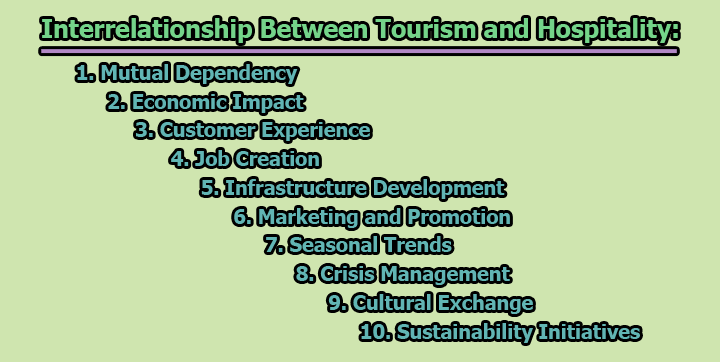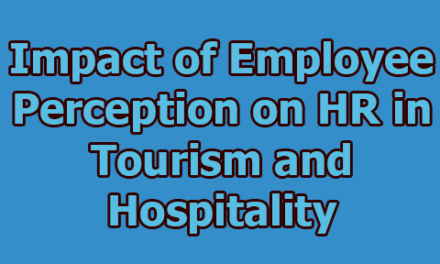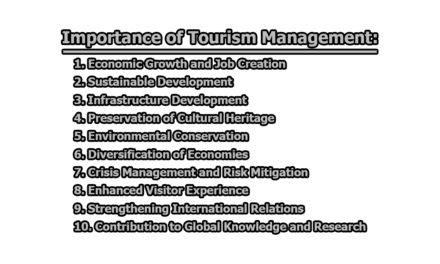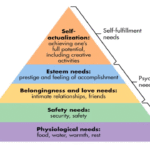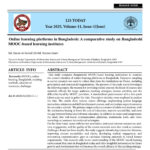Interrelationship Between Tourism and Hospitality:
In the intricate tapestry of the global economy, few industries are as intertwined and mutually dependent as tourism and hospitality. The dynamic interplay between these sectors not only shapes the economic landscape but also influences cultural exchange, environmental sustainability, and crisis management strategies. In this article, we will delve into the interrelationship between tourism and hospitality.
1. Mutual Dependency: The symbiotic relationship between tourism and hospitality is characterized by a fundamental mutual dependency. Tourism relies on the infrastructure and services provided by the hospitality industry, including accommodations, dining, transportation, and recreational activities. Conversely, the hospitality sector thrives on the influx of tourists, as they generate demand for its services. This interdependence creates a delicate equilibrium, where disruptions in one sector can have cascading effects on the other.
For example, a decline in tourist arrivals can lead to a reduction in the demand for hotel rooms, restaurant services, and local attractions. This, in turn, affects the revenue and profitability of businesses within the hospitality sector. On the flip side, if the hospitality industry faces challenges such as a lack of quality accommodations or services, it could deter potential tourists, impacting the overall success of the tourism industry in a destination.
Understanding and managing this interdependency are crucial for the sustained growth of both sectors. Collaboration between tourism boards and hospitality businesses is essential to address challenges collectively and enhance the overall experience for visitors.
2. Economic Impact: The economic impact of tourism and hospitality extends far beyond the surface, influencing the overall prosperity of a region or country. Tourism, as a major economic driver, stimulates growth by generating income and creating employment opportunities. The hospitality sector, including hotels, restaurants, and other related services, significantly contributes to a country’s Gross Domestic Product (GDP).
Tourists contribute directly to the local economy through spending on accommodations, dining, transportation, and recreational activities. This infusion of capital has a multiplier effect, as it circulates through various sectors, creating a ripple of economic activity. Additionally, the hospitality industry’s role in job creation further boosts the economic landscape, particularly in regions heavily reliant on tourism.
Governments and businesses recognize the economic importance of these sectors and often implement policies and initiatives to support their growth. Strategies such as destination marketing, infrastructure development, and investment in training programs contribute to a thriving tourism and hospitality ecosystem.
3. Customer Experience: At the heart of tourism and hospitality lies the concept of customer experience, a crucial element that shapes the industry’s success. The hospitality sector is tasked with providing a seamless and enjoyable experience for tourists, encompassing everything from accommodation quality to local attractions and cultural immersion.
Tourists today seek personalized and authentic experiences, and the hospitality industry plays a pivotal role in meeting these expectations. Hotels and accommodations must go beyond providing a place to stay; they are integral to curating an immersive experience that reflects the unique character of the destination. Similarly, restaurants and local businesses contribute to the overall satisfaction of tourists by offering a taste of local cuisine and culture.
Positive customer experiences not only encourage repeat visits but also contribute to the destination’s reputation through word-of-mouth and online reviews. In the age of social media, where every tourist is a potential influencer, the impact of customer experience on a destination’s image cannot be overstated.
4. Job Creation: The symbiotic relationship between tourism and hospitality is a potent generator of employment opportunities. As tourist numbers increase, so does the demand for a diverse range of services, from hotel staff and restaurant employees to tour guides and transportation providers. Local communities, particularly in areas heavily reliant on tourism, benefit significantly from the influx of job opportunities.
The hospitality sector is known for its ability to absorb both skilled and unskilled labor, providing entry-level positions as well as career advancement opportunities. This not only contributes to the economic well-being of individuals but also helps in community development by raising living standards.
However, it’s essential to acknowledge the potential downsides, such as seasonal employment and job insecurity during economic downturns or crises. Sustainable job creation strategies that focus on skill development, employee welfare, and community engagement are crucial for maximizing the positive impact of tourism and hospitality on local economies.
5. Infrastructure Development: Tourism serves as a catalyst for infrastructure development, driving improvements in transportation, accommodations, and public facilities. The influx of tourists necessitates enhancements to existing infrastructure and the creation of new amenities to accommodate their needs.
For instance, airports and transportation networks may undergo expansions or renovations to handle increased visitor arrivals. The hotel and accommodation sector may witness investments in new properties, renovations, or the development of unique lodging options to cater to diverse preferences. Public spaces, attractions, and cultural sites may also undergo upgrades to enhance the overall visitor experience.
Infrastructure development not only benefits tourists but also contributes to the long-term growth and sustainability of a region. Improved infrastructure can attract more tourists, leading to increased revenue and economic development. However, it’s crucial for these developments to align with sustainable practices to minimize environmental impact and preserve the destination’s cultural and natural assets. Coordination between the tourism industry, hospitality sector, and local governments is essential for ensuring infrastructure developments align with the long-term goals of the destination.
6. Marketing and Promotion: Effective marketing and promotion are vital components in the success of both tourism and hospitality. These sectors often collaborate to create cohesive and compelling narratives that showcase a destination’s unique offerings. Joint marketing initiatives can significantly amplify the impact of promotional campaigns, reaching a wider audience and increasing the destination’s visibility.
Collaboration between tourism boards and hospitality businesses allows for the creation of integrated marketing strategies. For example, hotels and resorts can align their promotional efforts with the broader tourism campaign of a destination, featuring exclusive packages or experiences. Similarly, tourism campaigns can leverage the amenities and services offered by the hospitality sector to enhance the overall appeal of the destination.
Digital marketing, social media campaigns, and strategic partnerships play pivotal roles in promoting tourism and hospitality collectively. By presenting a unified front, these sectors can effectively position a destination in the minds of potential tourists, driving interest and encouraging visitation.
7. Seasonal Trends: Tourism is often characterized by seasonal trends, with peak and off-peak periods influencing visitor numbers. Understanding and navigating these trends are essential for both tourism and hospitality to optimize their operations throughout the year.
During peak seasons, the demand for accommodations, services, and attractions is high, presenting opportunities for increased revenue. However, it also poses challenges such as overcrowding, resource strain, and potential negative impacts on the local environment. Conversely, off-peak seasons may see reduced visitor numbers, prompting the need for creative marketing strategies and special promotions to attract tourists during these periods.
The hospitality sector must be adaptable to these seasonal fluctuations, adjusting staffing levels, pricing strategies, and promotional activities accordingly. Collaboration between tourism and hospitality stakeholders is critical in developing strategies to promote off-peak travel, balance visitor distribution, and ensure sustainable tourism practices.
8. Crisis Management: In an increasingly interconnected world, both tourism and hospitality are susceptible to various crises, including natural disasters, pandemics, geopolitical events, and security threats. Effective crisis management requires collaboration and coordination between these sectors to safeguard the well-being of tourists, maintain business continuity, and protect the destination’s reputation.
During crises, the hospitality sector plays a crucial role in providing support and assistance to tourists. This includes implementing safety protocols, offering flexible cancellation policies, and collaborating with local authorities and emergency services. Tourism boards and hospitality businesses must work hand-in-hand to communicate accurate and timely information to visitors, ensuring their safety and well-being.
Joint crisis management efforts also involve planning for resilience, implementing risk mitigation strategies, and establishing clear communication channels between tourism and hospitality stakeholders. The ability to navigate crises collaboratively enhances the overall resilience of both industries, instilling confidence in tourists and maintaining the long-term sustainability of a destination.
9. Cultural Exchange: Tourism serves as a powerful vehicle for cultural exchange, fostering understanding and appreciation between diverse communities. The hospitality sector, as the host, plays a pivotal role in shaping the cultural narrative of a destination and facilitating meaningful interactions between tourists and locals.
Hotels, restaurants, and tour operators can contribute to cultural exchange by offering authentic experiences that showcase local traditions, cuisine, and lifestyles. Engaging with the local community and promoting responsible tourism practices help preserve cultural heritage while providing tourists with enriching and educational experiences.
Collaboration between tourism and hospitality stakeholders is crucial in promoting culturally sensitive practices. This includes training staff to respect and celebrate diversity, supporting local artisans and businesses, and integrating cultural elements into the overall tourist experience. By fostering cultural exchange, tourism and hospitality can contribute to global understanding and promote sustainable tourism practices.
10. Sustainability Initiatives: As environmental concerns become increasingly prominent, sustainability has emerged as a critical consideration for both tourism and hospitality. Collaborative efforts between these sectors are essential to minimize their ecological footprint and contribute to responsible and sustainable practices.
The hospitality industry has been at the forefront of sustainability initiatives, with many hotels and resorts implementing eco-friendly practices, reducing waste, and incorporating renewable energy sources. Tourism boards can collaborate with hospitality businesses to promote responsible tourism, encouraging visitors to respect local environments, wildlife, and communities.
Joint sustainability initiatives may include the development of eco-friendly accommodations, the promotion of responsible tourism guidelines, and the support of conservation projects. By working together, tourism and hospitality can contribute to the preservation of natural resources, biodiversity, and the overall well-being of the destinations they serve. The emphasis on sustainability not only aligns with global environmental goals but also resonates with an increasing number of conscientious travelers who prioritize eco-friendly and socially responsible experiences.
In conclusion, the interrelationship between tourism and hospitality paints a vivid portrait of interdependence and collaboration. From the foundational mutual dependency to the economic impact, customer experience, job creation, infrastructure development, marketing, seasonal trends, crisis management, cultural exchange, and sustainability initiatives, these two sectors weave a tapestry that shapes the global landscape. Their symbiotic relationship is not only evident in the seamless experiences tourists enjoy but also in the profound economic contributions to local communities. As we navigate an evolving world, recognizing and nurturing this interrelationship becomes paramount. By fostering collaborative efforts, embracing sustainability, and navigating challenges together, tourism and hospitality can continue to be catalysts for economic growth, cultural exchange, and the creation of unforgettable experiences for travelers worldwide.

Assistant Teacher at Zinzira Pir Mohammad Pilot School and College

